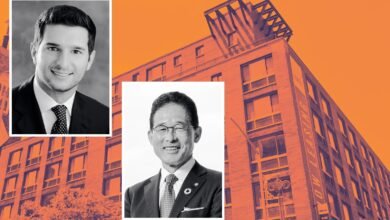Model Abandons NYC Apartment But Leaves Squatter Behind

Fashion model Aubrey Hill has blonde hair, blue-green eyes, a 24-inch waist — and $53,340 in rent arrears, her Manhattan landlord claims.
Hill is the first high-fashion model from West Virginia, but not the first tenant to skip out on a lease. That wouldn’t be a big problem, except that she gave someone named Tasheem Jenkins keys to her rent-stabilized Washington Heights apartment, and he refuses to leave.
A series of housing court judges have allowed Jenkins to remain, though he’s not on the lease at 367 Wadsworth Avenue and has never paid the $1,675 rent, legal filings show.
Representing himself in housing court against a team of lawyers, Jenkins has managed to fend off eviction since October 2023, when the owner filed a case to regain possession of the apartment. At the time, Hill owed more than $19,000.
The arrears have nearly tripled since then, according to affidavits filed by the building’s attorney and property manager. Hill agreed in December 2023 to pay $23,177 in arrears plus current rent the following month. She tried to add Jenkins to that agreement, but he was never on the lease and never had permission to occupy the apartment, the filings allege.
Hill did not respond to an email sent to her modeling representatives in Paris, Milan, London and Geneva. She last paid rent in 2021, although the state’s Emergency Rental Assistance Program made a payment on her behalf the next year before becoming insolvent.
Jenkins could not be reached. An internet search found one reference to his name — a 2022 lawsuit in Brooklyn alleging he sustained injuries in a car crash.
The eviction case shows how difficult it can be in New York to remove someone from an apartment, which helps to explain the city’s record-low vacancy rate and the financial strain on a rent-stabilized property like 367 Wadsworth Avenue, a 24-unit building built in 1929.
Jenkins has been able to stay in Apartment D despite having no lease, no attorney and no canceled rent check. Hill’s lease expired 16 months ago. On numerous occasions, a city marshal has been scheduled to carry out the eviction only to have Jenkins petition the court for more time — and get it.
Jenkins purportedly sought rental assistance from a one-shot deal, Homebase, and CityFHEPS vouchers, but did not qualify because an applicant must be on the lease. Even if he did qualify for the aid, the landlord would have to accept him as a tenant, which the owner told the court it would not do.
Applying for those programs, however, helped drag out the case. Jenkins is now seeking his 11th order to show cause. Most have been denied, in part because he has not demonstrated an ability to pay the arrears, but each time an eviction date is set, he requests another order to show cause and gets a reprieve. In one filing, he sought succession rights to the apartment.
Housing court judges tend to advise tenants who appear in court without a lawyer, and when Jenkins claimed he had knee surgery in October, a judge referred him to Adult Protective Services, which assists physically or mentally impaired adults. That delayed the case for months.
When that agency rejected Jenkins as a client in February, he referred himself to the same agency and cited the self-referral as a reason to delay eviction. “His game-playing has been going on for years,” the landlord’s legal team responded in a filing.
“This is by all appearances a completely able-bodied young man,” said an owner of Wadsworth Ventura Associates 367 LLC, which controls the building.
The owner said he plans to go to housing court personally for a hearing in the case Wednesday, “to make a stink.”
The LLC has rung up about $34,000 in legal fees on the case.
Read more

The Daily Dirt: City Council takes aim at squatters

4 years, $60k in arrears: A portrait of housing court delays at their worst

LeFrak, citing “nightmarish” delays, takes housing court to court




